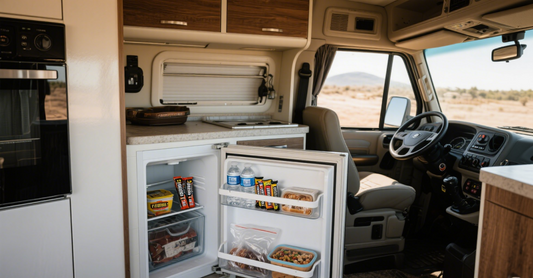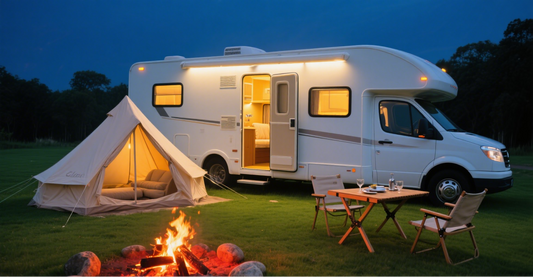What is better, an AGM or a lithium battery for RV?
According to a report published by Fortune Business Insights, the lithium-ion battery market is projected to grow at a 23.22% compound annual growth rate from 2025 to 2032, driven by the increasing adoption of lithium-ion batteries over traditional absorbed glass mat (AGM) batteries. This article provides a detailed comparison of AGM vs. lithium battery options to help RV campers make an informed decision based on performance, cost, and practicality.


Understanding AGM and Lithium RV Batteries
To make the best choice, it's essential to understand the core characteristics of AGM and lithium batteries and their roles in RV camping.
AGM Batteries
AGM batteries, or absorbed glass mat batteries, are a type of traditional lead-acid battery. The electrolyte is held in a fiberglass mat, making them spill-proof and maintenance-free.
Widely used in backup power systems and RV applications, AGM batteries deliver high currents for starting motors or powering appliances. They are reliable and affordable but heavier and less efficient than lithium batteries.
Lithium RV Batteries (LiFePO4)
Lithium ion batteries, particularly lithium iron phosphate (LiFePO4), are increasingly favored for RV use due to their high energy density and longer lifespan.
Unlike lithium-ion lithium polymer (LiPo) batteries, which are commonly used in portable electronic devices but pose a risk of thermal runaway, LiFePO4 batteries are safer and better suited for RV applications.
Their lightweight design, deep discharge capability, and built-in battery management systems (BMS) make them ideal for RVs and solar setups.
Key Factors in Comparing AGM vs. Lithium RV Batteries
Evaluating AGM and lithium batteries across key factors helps determine which suits your RV needs.
RV Battery Performance and Efficiency
- Lithium RV batteries offer over 95% efficiency, ensuring most of your solar or generator power is stored and used effectively. They charge up to four times faster than AGM batteries, often in 5-6 hours for a 100Ah battery with a 20A charger.
For example, a 200W solar panel can fully charge a 100Ah lithium battery in about 5 hours under optimal conditions, saving valuable daylight for off-grid campers. Lithium batteries also support partial charging without capacity loss, offering flexibility for variable charging scenarios.
- AGM batteries, with 80-85% efficiency, lose more energy during charging and discharging. Charging a 100Ah AGM battery takes around 8 hours, requiring longer solar exposure or generator use. Partial charging can reduce capacity over time, making them less suitable for inconsistent charging conditions.
Depth of Discharge (DoD)
Depth of discharge (DoD) measures how much of a battery's capacity can be used without damage.
- Lithium RV batteries support 80-100% DoD, meaning a 100Ah battery delivers 80-100Ah of usable power. This efficiency reduces the need for multiple batteries, saving RV space and cost.
For instance, a Temgo 12V 100Ah lithium battery meets the same power needs as a 200Ah AGM battery, which is limited to 50% DoD, reducing overall costs and weight.
- AGM batteries are restricted to 50% DoD to avoid shortening their lifespan. A 100Ah AGM battery provides only 50Ah of usable power, often requiring a larger battery bank to match lithium's capacity, increasing space and weight demands.
Lifespan and Durability
- Lithium Battery can be recharged 3,000-5,000 times at a 100% discharge depth, which is equivalent to 5-10 years of normal use. Many models include self-heating technology for reliable performance in cold weather, such as a Temgo 12V lithium RV battery, ideal for winter camping.
- AGM batteries typically last 300-1,000 cycles, or 3-5 years, depending on usage and maintenance. They are more vulnerable to extreme temperatures, which can degrade performance in harsh RV environments.
Size and Weight
Weight and space are vital for RV campers seeking to optimize fuel efficiency and storage.
- Lithium batteries provide a lightweight design and high energy, with a 12V 100Ah battery weighing 21-30 lbs and offering ~50-60 Wh/lbs of energy density. This compactness suits smaller RVs or travel trailers.
- AGM batteries are heavier, with a 12V 100Ah battery weighing 60-80 lbs and delivering 7-10 Wh/lbs. They are better suited for larger RVs where weight is less critical but take up more space and reduce fuel efficiency.
Safety
In the confined space of an RV, many owners worry about the safety of having batteries inside the vehicle. This is why lithium iron phosphate batteries were designed specifically for this purpose.
- Lithium RV batteries produce no hydrogen gas and include a BMS to prevent overcharging, over-discharging, or overheating, making them safe for confined spaces without special ventilation.
- AGM batteries can release hydrogen gas if overcharged, posing risks of poisoning or explosion if not properly vented. To reduce these risks, it is best to install them in a battery box with ventilation openings or outside the living area of the motorhome.
Initial Cost and Long-Term Cost
AGM batteries are more affordable upfront, costing $100-$300 for a 12V 100Ah battery. However, their shorter lifespan means replacing a $200 AGM battery every 3-5 years, potentially costing $400-$600 over 10 years.
A 100Ah lithium RV battery costs between $500 and $1,000, but its longer lifespan and higher efficiency result in lower costs per cycle. For frequent campers, a $300 Temgo 12V 100Ah battery can last 5-10 years, making it more cost-effective in the long run.
Environmental Impact
Lithium batteries, with high energy density and longer lifespan, require fewer replacements, reducing waste. They are recyclable, contain no lead, and have a 20-30% lower carbon footprint due to higher efficiency. AGM batteries are recyclable, but their shorter lifespan leads to more frequent replacements, increasing environmental impact.
Both types require recycling at certified facilities to prevent environmental harm. Check local regulations for proper disposal.
Comparison Table: AGM vs. Lithium RV Batteries
The following table summarizes key differences to aid your decision-making:
| Factor (e.g., 100Ah) | AGM Battery | Lithium (LiFePO4) Battery |
|---|---|---|
| Efficiency | 80–85% | >95% |
| Charge Time | ~8 hours | 5–6 hours (1–2 hours for some) |
| DoD | 50% | 80–100% |
| Cycles | 300–1,000 | 3,000–5,000 (at 100% DoD) |
| Weight | 60–80 lbs | 21–30 lbs |
| Energy Density | 7–10 Wh/lbs | 50–60 Wh/lbs |
| Ventilation Needed | Yes | No |
| Smart Features | None | Bluetooth, LCD (select models) |
| Warranty | 1–2 years | 5–10 years |
Pros and Cons of Lithium and AGM Batteries
Lithium RV Batteries: Offer longer lifespan, higher efficiency, lightweight design, and smart features. Ideal for frequent off-grid campers or solar users, despite higher initial cost.
AGM Batteries: Affordable upfront and reliable for basic needs. Suitable for occasional campers or larger RVs with power access, but heavier and less efficient.
Making the Right Choice for Your RV
To choose between lithium and AGM batteries, assess your camping habits, power needs, and budget. Calculate your daily power needs (e.g., 100Ah for a fridge, lights, and devices) and compare usable capacity, one 100Ah lithium battery vs. two 100Ah AGM batteries.
For frequent off-grid or solar-powered camping, lithium's efficiency, capacity, and durability make it a worthwhile investment. For occasional campers with hookups, AGM's lower cost is practical.
Conclusion
Lithium RV batteries, backed by extensive testing in RV solar applications, offer significant advantages over AGM batteries for most campers, particularly for off-grid adventures.
Their high energy density, longer lifespan, and maintenance-free operation ensure reliable power. AGM batteries remain a practical choice for budget-conscious users with minimal power needs, but their limitations in efficiency and durability may not suit frequent campers.
Temgo's LiFePO4 batteries are tailored for RV camping, offering 5,000+ cycles, a BMS for safety, and Bluetooth monitoring via the Temgo app for real-time insights.
Certified by CE, FCC, and RoHS, Temgo batteries are backed by a 5-year warranty and customer support. If you are looking for a high-performance RV battery, explore how the Temgo 12V Battery can enhance your RV adventure experience.


